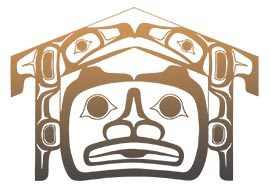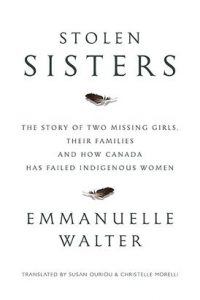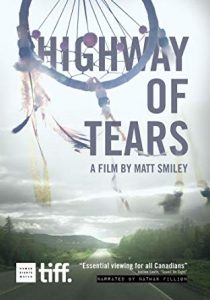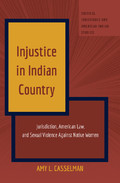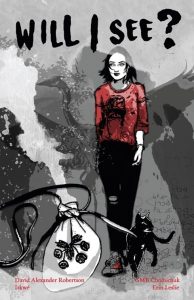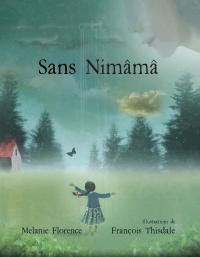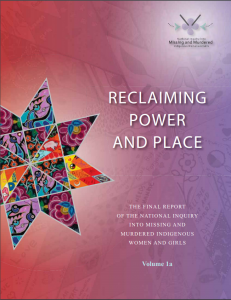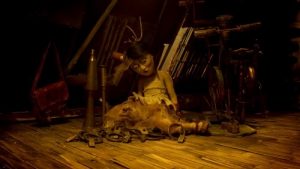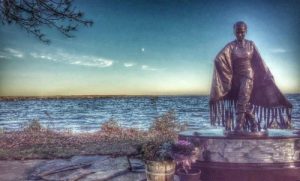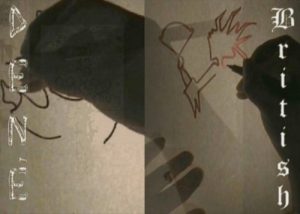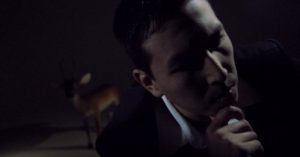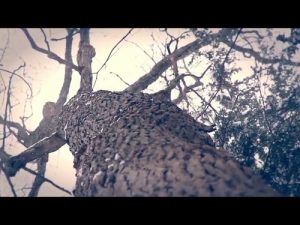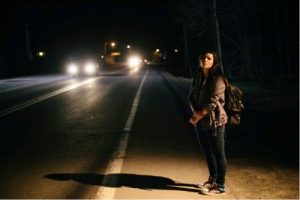The collections currently comprise approximately 12,000 items including about 6,000 books, 450 videos, 5,000 vertical file materials, curriculum resources, journals and newspapers, maps, posters, theses and dissertations, the G.A. (Bud) Mintz special collection, and some archival materials. The collections focus on First Nations in British Columbia, including contextual materials on Canadian First Nations, in addition to issues of national and international interest to First Nations and Indigenous peoples. X̱wi7x̱wa collects materials written from First Nations perspectives, such as materials produced by First Nations, First Nations organizations, tribal councils, schools, publishers, researchers, writers and scholars.
Featured collections
Autumn at Xwi7xwa
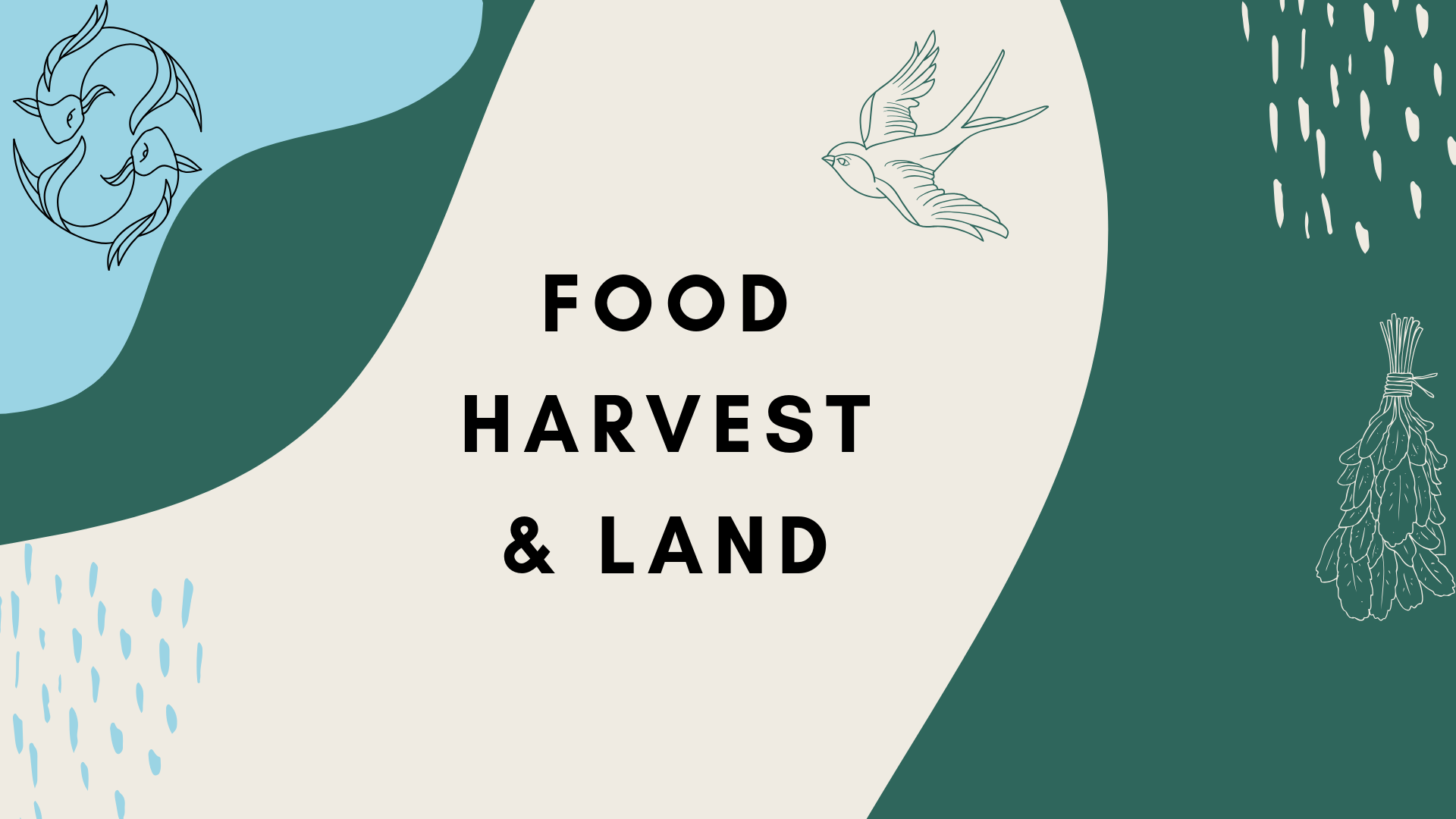
As the days fill with crisp air and gorgeous foliage, the longer nights are spent with good books–something we love to do here at the library. Whether you’re spending your fall cozied up on the couch with books or outside in nature, we’ve highlighted some great books on food, harvest and land for you to read this Autumn season.
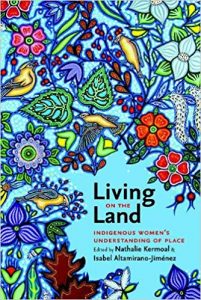
Living on the Land: Indigenous Women’s Understanding of Place edited by Nathalie Kermoal and Isabel Altamirano-Jiménez looks at how patriarchy, gender, and colonialism shape the experiences of Indigenous women as both knowledge holders and knowledge producers. Different writers explore the nature and scope of Indigenous women’s knowledge, how knowledge is rootedness in relationships both human and spiritual, and how knowledge is not inseparable from land and landscape.
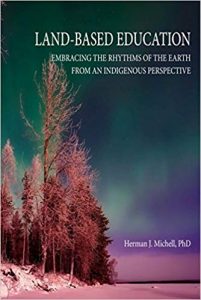
Land-Based Education: Embracing the Rhythms of the Earth from an Indigenous Perspective by Herman J. Michell, PhD explores two different land-based educators insights and experiences on connecting learning to the land and environment.
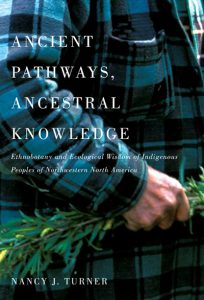 Ancient Pathways, Ancestral Knowledge: Ethnobotany and Ecological Wisdom of Indigenous Peoples of Northwestern North America by Nancy J. Turner creates and explains a complex understanding of the traditions of use and management of plant resource throughout North America.
Ancient Pathways, Ancestral Knowledge: Ethnobotany and Ecological Wisdom of Indigenous Peoples of Northwestern North America by Nancy J. Turner creates and explains a complex understanding of the traditions of use and management of plant resource throughout North America.
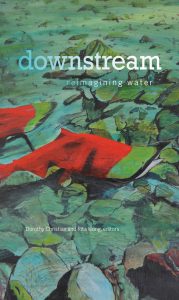 Downstream: Reimagining Water edited by Dorothy Christian and Rita Wong showcases artists, writers, scientists, scholars, environmentalists, and activists who examine the shared human need for clean water that is crucial to building peace and good relationships with each other and the planet.
Downstream: Reimagining Water edited by Dorothy Christian and Rita Wong showcases artists, writers, scientists, scholars, environmentalists, and activists who examine the shared human need for clean water that is crucial to building peace and good relationships with each other and the planet.
Food will Win the War: the Politics, Culture, and Science of Food on Canada’s Home Front by Ian Mosby looks at the symbolic and material transforming that food and eating undertook in Canada during the 1940s and those transformations through a profound social, political, and cultural lens.
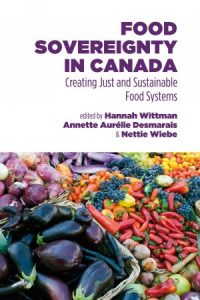 Food sovereignty in Canada: Creating Just and Sustainable Food Systems edited by Hannah Wittman, Annette Desmarais, Nettie Wiebe explores how Canadian agricultural and food policies are contributing to the current global food crisis and community responses to those policies.
Food sovereignty in Canada: Creating Just and Sustainable Food Systems edited by Hannah Wittman, Annette Desmarais, Nettie Wiebe explores how Canadian agricultural and food policies are contributing to the current global food crisis and community responses to those policies.
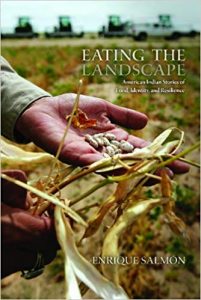 Eating the Landscape: American Indian Stories of Food, Identity, and Resilience by Enrique Salmón touches an array of indigenous farmers who uphold traditional practices in the face of modern changes to food systems in this personal narrative from the University of Arizona Press.
Eating the Landscape: American Indian Stories of Food, Identity, and Resilience by Enrique Salmón touches an array of indigenous farmers who uphold traditional practices in the face of modern changes to food systems in this personal narrative from the University of Arizona Press.
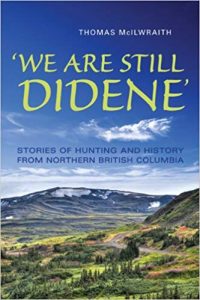 ‘We Are Still Didene’: Stories of Hunting and History from Northern British Columbia by Thomas McIlwraith examines Iskut, BC’s transition from subsistence hunting to wage work in trapping, guiding, construction, and service job, and challenges the idealized images of Indigenous Peoples that underlie state-sponsored traditional ecological knowledge (TEK) studies
‘We Are Still Didene’: Stories of Hunting and History from Northern British Columbia by Thomas McIlwraith examines Iskut, BC’s transition from subsistence hunting to wage work in trapping, guiding, construction, and service job, and challenges the idealized images of Indigenous Peoples that underlie state-sponsored traditional ecological knowledge (TEK) studies
And just in time for Thanksgiving! Let us know if you make something from our cookbooks for your families this thanksgiving:
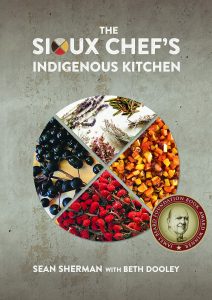 The Sioux Chef’s Indigenous Kitchen by Sean Sherman with Beth Dooley is a rich cookbook with a delicious introduction to modern indigenous cuisine of the Dakota and Minnesota territories.
The Sioux Chef’s Indigenous Kitchen by Sean Sherman with Beth Dooley is a rich cookbook with a delicious introduction to modern indigenous cuisine of the Dakota and Minnesota territories.
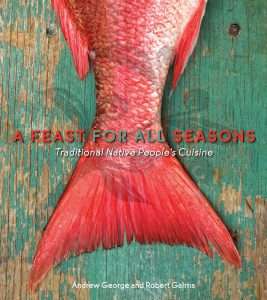 A Feast for All Seasons: Tradional Native People’s Cuisine by Andrew George Jr. and Robert Gairns features recipes with ingredients from the land, sea, and sky, and focuses on an enduring cuisine that illustrates respect for the environment and the spiritual power that food can have in our lives.
A Feast for All Seasons: Tradional Native People’s Cuisine by Andrew George Jr. and Robert Gairns features recipes with ingredients from the land, sea, and sky, and focuses on an enduring cuisine that illustrates respect for the environment and the spiritual power that food can have in our lives.
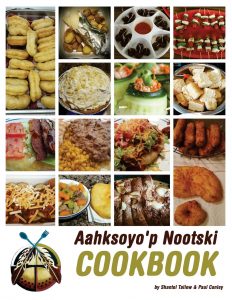 Aahksoyo’p Nootski Cookbook: Authentic Indigenous Comfort Food by Shantel Tallow & Paul Conley features Blackfeet comfort food like bannock and chili. Aahksoyo’p means “we’re going to eat” in the Blackfoot language.
Aahksoyo’p Nootski Cookbook: Authentic Indigenous Comfort Food by Shantel Tallow & Paul Conley features Blackfeet comfort food like bannock and chili. Aahksoyo’p means “we’re going to eat” in the Blackfoot language.
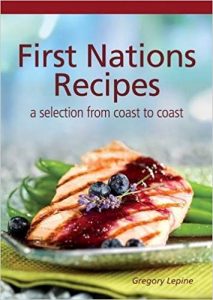 First Nations Recipes: a Selection From Coast to Coast by Gregory Lepine combines traditional Native cooking with historic and currently available ingredients.
First Nations Recipes: a Selection From Coast to Coast by Gregory Lepine combines traditional Native cooking with historic and currently available ingredients.
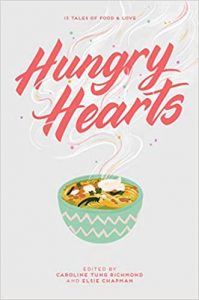 Hungry Hearts: 13 tales of Food & Love edited by Elsie Chapman and Caroline Tung Richmond is a collection of interconnected short stories that shows the many meanings food can take on beyond mere nourishment in our lives.
Hungry Hearts: 13 tales of Food & Love edited by Elsie Chapman and Caroline Tung Richmond is a collection of interconnected short stories that shows the many meanings food can take on beyond mere nourishment in our lives.
Orange Shirt Day on September 30
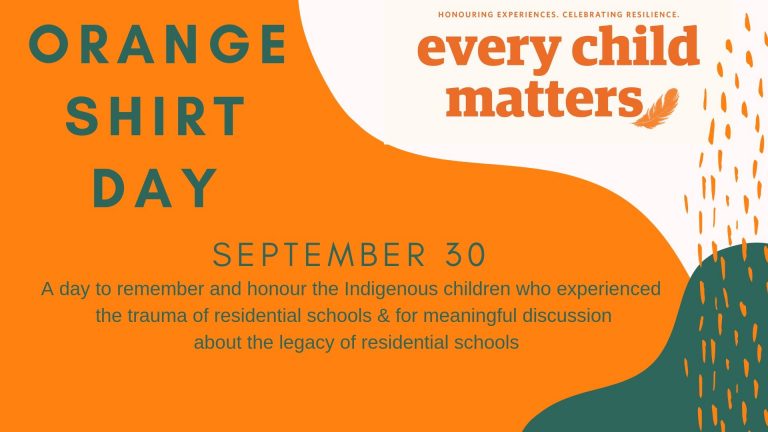
September 30 is an annual day to recognize & raise awareness about the residential school system in Canada, join together in the spirit of reconciliation, and honour the experiences of Indigenous People. Share your support and orange shirt on September 30th with the hashtag #orangeshirtday on social media.
Orange Shirt Day is inspired by Phyllis Webstad’s story. On her first day of residential school, Phyllis’s grandmother gave her a brand new orange shirt . When Phyllis got to residential school, her shirt was taken from her and never returned. The colour orange has always reminded Phyllis of her traumatic experience at residential school.
If you need support during this time (or at any time of year), please consider these resources:
Drop-in counseling at the Longhouse. No appointment needed:
Tuesdays, 1 – 4 pm, with Renée
Wednesdays, 1 – 4 pm, with Michael
Thursdays, 1 – 4 pm, with Leslie
Kuu-us 24hr crisis line:
Adult/Elder Crisis Line: 250-723-4050
Child/Youth Crisis Line: 250-723-2040
Find more information about Residential Schools in our Indian Residential Schools in Canada Research Guide.
Visit the Indian Residential School and Dialogue Centre at UBC. They are open Monday to Friday from 10am-3pm.
Check out the Orange Shirt Day website to read more on the story behind this day of remembrance.
The Museum of Vancouver is offering free admission on Monday, September 30th, for visitors who wear their orange shirt from 10am-5pm. make sure to visit their “There is Truth Here: Creativity and Resilience in Children’s Art from Indian Residential and Day Schools”exhibit. The exhibit focuses on focuses on rare surviving artworks created by children who attended the Inkameep Day School (Okanagan), St Michael’s Indian Residential School (Alert Bay); the Alberni Indian Residential School (Vancouver Island) and Mackay Indian Residential School (Manitoba).
If you are looking for children’s books on residential schools, please look at our Residential Schools Children’s Books List.

Pride at X̱wi7x̱wa Library
Happy Pride UBC!
This year X̱wi7x̱wa Library celebrates pride at your local UBC events, with our Spotlight Series, and featuring our new Two-Spirit research guide!
Visit us on September 6th, 2019 at the Fairview Commons (outside the Earth Sciences Building) and explore queer titles in our collection.
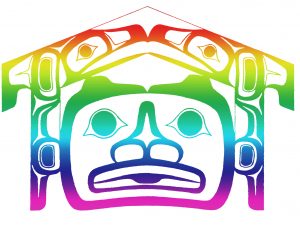
Queer & 2S Books at Xwi7xwa Library
Two-Spirit and Indigenous Queer Studies Research Guide
1. Joshua Whitehead



Author of Jonny Appleseed (novel) and full-metal indigiqueer (poetry collection). Whitehead is a Two-Spirit Oji-Cree from Treaty 1 territory in Peguis First Nation, MB. For Jessica John’s interview with Whitehead in Room magazine see.
Find Joshua Whitehead titles at UBC Library!
2. Billy-Ray Belcourt
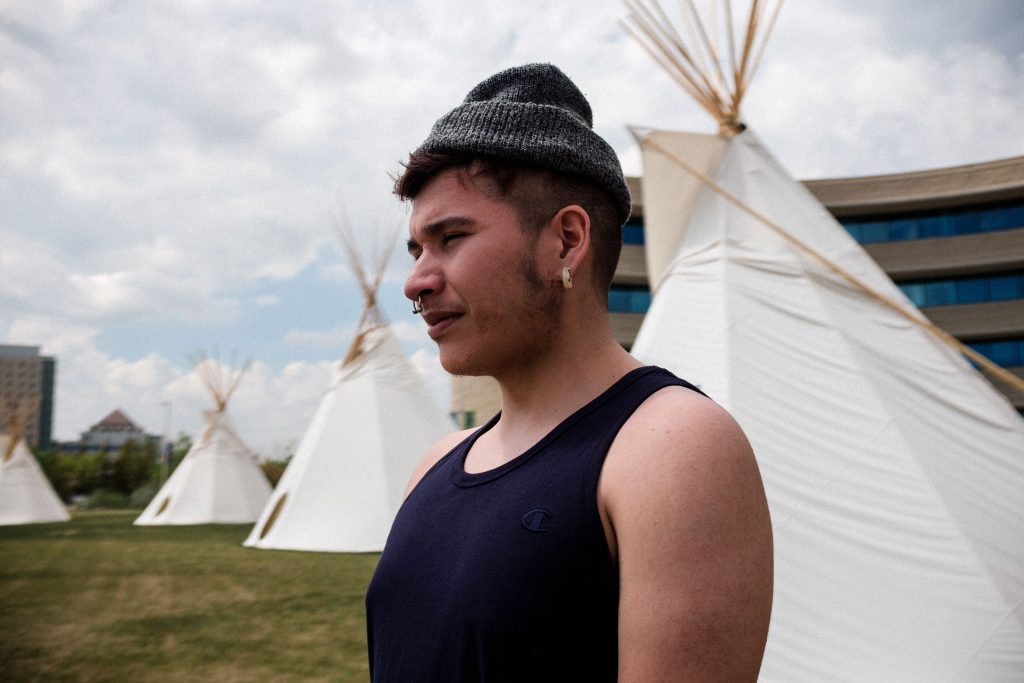

Author of This Wound is a World and NDN Coping Mechanisms. Belcourt is Cree from the Driftpile Creed Nation. Click for Belcourt on YouTube and their public scholarship.
Find Billy-Ray Belcourt titles at UBC Library!
3. Daniel Heath Justice



Cherokee author Daniel Heath Justice writes Indigenous and queer fantasy, weird fiction, creative nonfiction, and researches Indigenous literary and cultural studies, animal cultural history, gender and sexuality, and speculative fiction. He is also a faculty member at UBC Vancouver.
For CBC North by Northwest interview with Justice see here (begins at 2:07:30).
For Justice’s interview with Black Coffee Poet on Queer Indigenous Literature see here.
Find Justice’s work at UBC Library!
4. Sts’iyóye smestíyexw slhá:li
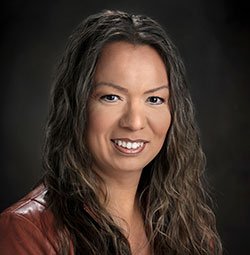
Image retrieved from https://www.nrtf.ca/impact/2012-recipient-stories/
Sts’iyóye smestíyexw slhá:li (Twin-Spirited Woman or Saylesh Wesley) is both Stó:lõ and Tsimshian. In her article “Twin-Spirited Woman: Sts’iyóye smestíyexw slhá:li” Wesley shares her stories and process of coming into community with the assistance of her grandmother. Wesley, “wishes to revitalize the cultural roles of transgendered/two-spirit people within the Coast Salish territory and ways in which they historically contributed to their societies prior to colonization.”
In 2017 as a result of transphobia/homophobia in Chilliwack’s community, Peggy Janicki wove a shawl for Sts’iyóye smestíyexw slhá:li and held a ceremony to bring “order and grace” out of “chaos and hurt”; see page 20 of Teacher Magazine.
5. Shawnee

Shawnee is a soul, R&B, pop, and alternative Mohawk Two-Spirit artist. Her music aims to “support, heal, and empower.” Her work has been featured on Disney TV, at NYC Pride, and to support Canada’s suicide crisis.
Although her album has yet to be released, you can still stream it online.
Interested in music? Xwi7xwa has many titles on Indigenous music and artists, CD’s, and more! Here are some helpful tips for navigating our collection:
- WM = resources organized under call number WM cover topics about music
- phrase searching “audio cassette” while limiting to Xwi7xwa Library gives you music and language audio
- search by artist
6. Cris Derksen


Cris Derksen is a classically trained cellist from NorthTall Cree Reserve on her dad’s side and Mennonite on her mother’s side. Derksen’s music is a fusion of classical, traditional, and contemporary.
Although Xwi7xwa Library has yet to buy copies of Derksen’s albums, you can listen to Orchestral Powwow, The Collapse, and The Cusp online.
You can also read more about Derksen here or by searching “Cris Derksen” in Summon or the Catalogue.
If you like Derksen you might also like Jeremy Dutcher!
7. Continuous by Wiagañmiu (Jenny Irene Miller)

Wiagañmiu is Inupiaq from Nome, with roots in Kiqigin (Wales, Alaska). Miller identifies as both gay and Two-Spirit and her photography supports the lesbian, gay, bisexual, transgender, queer and Indigenous LGBTQ+ and Two-Spirit communities.
“Continuous is my small answer to the large question: how do we as Indigenous people decolonize our sexualities, genders, and the way we treat individuals who identify outside of the standard binary of male or female? I have replied to that question with this ongoing portrait series featuring members of the Indigenous lesbian, gay, bisexual, queer, and Two-Spirit (LGBTQ2) community.”
Miller on instagram: @jennyirenemiller
Read more about Miller in her article The Many Ways We Love from Canadian Art.
8. Gender


Masculindians: Conversations about Indigenous Manhood
Between October 2010 and May 2013, Sam McKegney conducted interviews with leading Indigenous artists, critics, activists, and elders on the subject of Indigenous manhood. In offices, kitchens, and coffee shops, and once in a car driving down the 401, McKegney and his participants tackled crucial questions about masculine self-worth and how to foster balanced and empowered gender relations.
Find me at UBC Library!


Indigenous Men and Masculinities: Legacies, Identities, Regeneration
Innes and Anderson bring together prominent thinkers to explore the meaning of masculinities and being a man within such traditions, further examining the colonial disruption and imposition of patriarchy on Indigenous men. Building on Indigenous knowledge systems, Indigenous feminism, and queer theory, the sixteen essays by scholars and activists from Canada, the U.S., and New Zealand open pathways for the nascent field of Indigenous masculinities. The authors explore subjects of representation through art and literature, as well as Indigenous masculinities in sport, prisons, and gangs.
For CBC Interview with Rob Innes (co-editor) see here.
Find me at UBC Library!
Kent Monkman and Miss Chief
Cree artist Kent Monkman and gender-fluid Miss Chief Eagle Testickle explore topics on colonization, sexuality, loss, and resilience.
For CBC Radio interview see here.
Find resources on Monkman at Xwi7xwa Library!
MMIWG Selected Titles
MMIWG Selected Titles
- Stolen Sisters: the story of two missing girls, their families, and how Canada has failed Indigenous Women by Emmannuelle Walter
In 2014, the nation was rocked by the brutal violence against young Aboriginal women Loretta Saunders, Tina Fontaine and Rinelle Harper. But tragically, they were not the only Aboriginal women to suffer that year. In fact, an official report revealed that since 1980, 1,200 Canadian Aboriginal women have been murdered or have gone missing. This alarming official figure reveals a national tragedy and the systemic failure of law enforcement and of all levels of government to address the issue.
Journalist Emmanuelle Walter spent two years investigating this crisis and has crafted a moving representative account of the disappearance of two young women, Maisy Odjick and Shannon Alexander, teenagers from western Quebec, who have been missing since September 2008. Via personal testimonies, interviews, press clippings and official documents, Walter pieces together the disappearance and loss of these two young lives, revealing these young women to us through the voices of family members and witnesses.
Find me at UBC Library
- Highway of Tears a film by Matt Smiley
Highway of Tears‘ is about the missing or murdered women along a 724 kilometer stretch of highway in northern British Columbia. None of the 18 cold-cases since the 1960’s had been solved, until project E-Pana (a special division of the RCMP) managed to link DNA to Portland drifter, Bobby Jack Fowler with the 1974 murder of 16 year-old hitchhiker, Colleen MacMillen. In Canada, over 600 Aboriginal women have been reported missing or been murdered since the 1960s. Viewers will discover what the effects of generational poverty, residential schools, systemic violence, and high unemployment rates have done to First Nations reserves and how they tie in with the missing and murdered women in the Highway of Tearscases. Aboriginal women are considered abject victims of violence. Now find out what First Nations leaders are doing to try and swing the pendulum in the other direction.
Find me at UBC Library
- Injustice in Indian Country: Jurisdiction, American Law, and Sexual Violence Against Native Women by Amy L. Casselman
Living at the intersection of multiple identities in the United States can be dangerous. This is especially true for Native women who live on the more than 56 million acres that comprise America’s Indian country – the legal term for American Indian reservations and other land held in trust for Native people. Today, due to a complicated system of criminal jurisdiction, non-Native Americans can commit crimes against American Indians in much of Indian country with virtual impunity. This has created what some call a modern day ‘hunting ground’ in which Native women are specifically targeted by non-Native men for sexual violence. In this urgent and timely book, author Amy L. Casselman exposes the shameful truth of how the American government has systematically divested Native nations of the basic right to protect the people in their own communities. A problem over 200 years in the making, Casselman highlights race and gender in federal law to challenge the argument that violence against Native women in Indian country is simply collateral damage from a complex but necessary legal structure. Instead, she demonstrates that what’s happening in Indiancountry is part of a violent colonial legacy – one that has always relied on legal and sexual violence to disempower Native communities as a whole. Injustice in Indian Country tells the story of American colonization through the eyes of Native women as they fight for justice. In doing so, it makes critical contributions to the fields of American law and policy, social justice and activism, women’s studies, ethnic studies, American Indian studies, and sociology.
Find me at UBC Library
- Will I see? by Davis A. Robertson; illustrated by GMB Chomichuk
May, a young teenage girl, traverses the city streets, finding keepsakes in different places along her journey. When May and her kookum make these keepsakes into a necklace, it opens a world of danger and fantasy. While May fights against a terrible reality, she learns that there is strength in the spirit of those that have passed. But will that strength be able to save her? A story of tragedy and beauty, Will I See illuminates the issue of missing and murdered Indigenous women. Based on the story by Iskwé and Erin Leslie.
Find me at UBC Library
- Sans Nimama by Melanie Florence; illustrated by Francois Thisdale
A young mother, one of the many missing indigenous women, watches over her small daughter as she grows up without her nimama. Together, but separated, they experience important milestones: the first day of school, first dance, first date, a wedding, and new life. A free-verse story of love, loss, and acceptance told in alternating voices, Missing Nimama shows the human side of a national tragedy. An afterword by the author provides a simple, age-appropriate context for young readers.
Find me at UBC Library
- Reclaiming Power and Place: The Final Report of the National Inquiry into Missing and Murdered Indigenous Women and Girls
The National Inquiry’s Final Report reveals that persistent and deliberate human and Indigenous rights violations and abuses are the root cause behind Canada’s staggering rates of violence against Indigenous women, girls and 2SLGBTQQIA people. The two volume report calls for transformative legal and social changes to resolve the crisis that has devastated Indigenous communities across the country.
The Final Report is comprised of the truths of more than 2,380 family members, survivors of violence, experts and Knowledge Keepers shared over two years of cross-country public hearings and evidence gathering. It delivers 231 individual Calls for Justice directed at governments, institutions, social service providers, industries and all Canadians.
As documented in the Final Report, testimony from family members and survivors of violence spoke about a surrounding context marked by multigenerational and intergenerational trauma and marginalization in the form of poverty, insecure housing or homelessness and barriers to education, employment, health care and cultural support. Experts and Knowledge Keepers spoke to specific colonial and patriarchal policies that displaced women from their traditional roles in communities and governance and diminished their status in society, leaving them vulnerable to violence.
Find the report online
Upcoming: we are currently developing a MMIWG research guide
Xwi7xwa would like to thank Andrea Groban-Oakunsheyld for allowing us to use their image in this spotlight series.
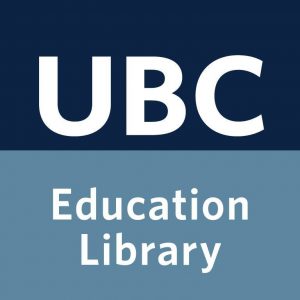 Xwi7xwa would like to thank Elena Pederson, Publications & Web Services Assistant, from UBC Education Library for her work on designing our digital signage.
Xwi7xwa would like to thank Elena Pederson, Publications & Web Services Assistant, from UBC Education Library for her work on designing our digital signage.
X̱wi7x̱wa Video Playlist
Did you know that you can watch X̱wi7x̱wa’s playlist of videos online?
UBC Library uses a platform called McIntyre Media to stream videos we’ve subscribed to.
- Search the phrase “Mcintyre media” in simple search and filter the results to Online OR click this link.
- Select any of the titles on the list to see their record.
- Under Actions on the right hand side click Online to gain access to 165 titles
Not sure what to watch? Check out these selected titles!
- Indigo by Amanda Strong
Indigo tells the story of a woman who confronts her internal war with the help of grandmother spider and faces the many layers of herself and life, to revitalize her spirit. Indigo examines the implications of the decline of the imagination concurrent with the rise of rationality and the cyclical war these two archetypes engage in.
2. Butterfly Monument by Jules Koostachin and Rick Miller
Butterfly Monument documents the creation a public memorial dedicated to the late Shannen Koostachin, a young Cree education advocate from Attawapiskat First Nation, Moskekowok territory. Through personal stories shared by Shannen’s immediate family we learn about who Shannen was and what motivated her passionate crusade for equitable access to education for Indigenous children and youth.
3. Crossed Mask by Christiana Latham
This work is based on questions about nicknames, what they were and why they were. It is an analysis of the labels and nicknames used within and in relation to my family.
4. He Who Dreams by Dana Claxton
A supernatural spiritual art film about a man who is in the dreamworld and the real world. The dreamworld and real worlds can be very similar.
5. The Oldest Tree in the World by Cara Mumford and Leanne Simpson
The Oldest Tree in the World is a love song to the oldest sugar maple in the region, living just outside of Peterborough in Mark S. Burnham Provincial Park. This grandmother tree, one of our oldest living relations, has witnessed over 500 years of history.
6. Stolen by Kawennáhere Devery Jacobs and Prospector Films
14 year old Shayna runs away from her group-home and into the truck of a dangerous man. As a result, she becomes one of Canada’s 1200+ Missing and Murdered Indigenous women.

Xwi7xwa would like to thank Elena Pederson, Publications & Web Services Assistant, from UBC Education Library for her work on designing our digital signage.
